Safe Days: Understanding Fertility, Prevention, And When To Consult A Gynaecologist
Introduction In India, many couples rely on natural methods like safe days to plan or avoid pregnancy. This method is linked to understanding a woman’s menstrual cycle, identifying fertile and infertile days, and making informed choices. While the concept is simple, miscalculations can lead to unintended pregnancy. That’s why consulting a gynaecologist or even a general physician is essential for safe, evidence-based guidance. This blog will explain safe days, how to calculate them, risks, and when to seek help. We’ll also explore the role of emergency contraception, lifestyle factors, and expert medical advice for Indian women and families. What Are Safe Days? Safe days refer to the days in a woman’s menstrual cycle when the chance of pregnancy is very low. This is part of the fertility awareness method (FAM), also called the calendar method. Couples often use this natural method either to avoid pregnancy or to increase the chance of conceiving. Fertile window: 5–6 days around ovulation. Safe days: Before ovulation starts and after ovulation ends. Unprotected sex on safe days: Lower pregnancy risk, but not zero. How the Menstrual Cycle Works The menstrual cycle typically lasts 28–32 days, but it varies from woman to woman. Key phases: Menstrual Phase (Day 1–5): Period bleeding. Follicular Phase (Day 1–13): Egg matures in the ovary. Ovulation (Day 14 in a 28-day cycle): Egg is released, fertile window. Luteal Phase (Day 15–28): Body prepares for pregnancy or next period. A gynaecologist can help women with irregular cycles track ovulation more accurately. How to Calculate Safe Days The calendar method is based on cycle length: Track your period for at least 6 months. Subtract 18 days from your shortest cycle → first fertile day. Subtract 11 days from your longest cycle → last fertile day. Example: Shortest cycle: 26 days → 26 - 18 = Day 8 (fertile start). Longest cycle: 30 days → 30 - 11 = Day 19 (fertile end). Fertile window = Day 8–19. Safe days = before day 8 and after day 19. Risk: Women with irregular cycles may not have reliable safe days. Role of a Gynaecologist in Family Planning A gynaecologist is the most trusted specialist for: Explaining safe days and fertility awareness. Diagnosing irregular periods and hormonal issues. Recommending contraception (pills, IUD, implants). Guiding safe pregnancy planning. Many Indian couples consult gynaecologists for personalized fertility planning rather than relying only on calendar apps. Role of a General Physician Not everyone goes directly to a gynaecologist. A general physician can: Provide primary counselling about safe sex. Suggest reliable contraception methods. Refer to a gynaecologist for advanced care. Platforms like Quickobook make it easy to find both gynaecologists and general physicians nearby for timely consultation. Emergency Contraception: Backup for Unsafe Days If unprotected sex happens on fertile days, emergency contraception can prevent pregnancy: Levonorgestrel pill (i-Pill, Unwanted-72): Works best within 72 hours. Ulipristal acetate (Ella): Effective up to 120 hours (5 days). Copper IUD: Most effective if inserted within 5 days. Emergency contraception is not for regular use. Always consult a gynaecologist for long-term family planning. Risks and Limitations of Safe Days Method Requires accurate cycle tracking. Doesn’t protect against STIs. Less effective if cycles are irregular. Stress, illness, or travel can shift ovulation. Lifestyle and Safe Days To make safe days more reliable: Maintain a healthy weight. Reduce stress (yoga, meditation). Avoid smoking, alcohol, and poor sleep. Track cycles using apps but confirm with medical advice. When to See a Doctor Consult a gynaecologist or general physician if: Your cycles are irregular. You experience severe pain, bleeding, or hormonal symptoms. You had unprotected sex and are worried about pregnancy. You need long-term contraception advice. Complications if Ignored Unplanned pregnancy → emotional and financial stress. Unsafe abortion practices in rural India. STIs if no barrier protection. Conclusion The safe days method can be effective for some women, but it carries risks if not used properly. A gynaecologist or general physician can guide you in safe family planning, contraception, and sexual health. In case of mistakes, emergency contraception is a reliable backup. For safe, personalized care, book an appointment with trusted doctors via Quickobook. Your health, your choice, your safety. Quickobook CTAs Find a gynaecologist near you on Quickobook. Book a general physician for sexual health counselling. Get confidential help for emergency contraception today. 50 FAQs on Safe Days Q1. What are safe days in a menstrual cycle? A. Safe days are the days outside the fertile window when the chance of pregnancy is low. Q2. Can safe days prevent pregnancy completely? A. No, the method reduces but does not eliminate pregnancy risk. Q3. Who can use the safe days method? A. Women with regular cycles are better candidates for this method. Q4. Is it safe to have sex during periods? A. Yes, but pregnancy is still possible if ovulation happens early. Q5. How do I calculate my fertile window? A. Track cycles, subtract 18 from shortest and 11 from longest cycle to find fertile days. Q6. Can stress affect safe days? A. Yes, stress can delay or advance ovulation, making calculation unreliable. Q7. Do gynaecologists recommend safe days method? A. Some do, but they usually recommend more reliable contraception as backup. Q8. Can I use safe days with condoms? A. Yes, combining methods increases effectiveness. Q9. Does the withdrawal method make safe days safer? A. No, withdrawal is unreliable because pre-ejaculate may contain sperm. Q10. What is the risk of pregnancy with safe days method? A. About 20–25 pregnancies per 100 women annually if used alone. Q11. Can a general physician explain safe days? A. Yes, they can provide guidance and refer to a gynaecologist if needed. Q12. Is emergency contraception effective during fertile days? A. Yes, if taken within the recommended time frame. Q13. Can I use apps to track safe days? A. Yes, but always confirm with medical advice. Q14. Do irregular cycles affect safe days? A. Yes, irregular cycles make it less reliable. Q15. Can breastfeeding affect safe days calculation? A. Yes, lactation can alter ovulation patterns. Q16. Is sex on day 10 safe in a 28-day cycle? A. No, this falls in the fertile window. Q17. What role does ovulation play in safe days? A. Ovulation is central; safe days depend on predicting ovulation timing. Q18. Can thyroid problems affect safe days? A. Yes, thyroid disorders can cause irregular cycles. Q19. Should teenagers use safe days method? A. No, it is less reliable for teens due to irregular cycles. Q20. Do safe days protect against HIV or STIs? A. No, only condoms provide protection against infections. Q21. How accurate is the safe days method? A. Accuracy is around 75–80% if cycles are regular. Q22. Can a gynaecologist confirm safe days? A. Yes, they can guide with ovulation tests and cycle monitoring. Q23. What is the safest day after periods? A. First 5–7 days after menstruation are usually safe. Q24. Can alcohol affect ovulation and safe days? A. Yes, excessive drinking can disrupt cycles. Q25. Is day 20 safe in a 28-day cycle? A. Generally, yes, as ovulation is over by then. READ ALSO: Effect Of Tight Clothing On Male Fertility And Sperm Health Q26. Do polycystic ovary syndrome (PCOS) patients have safe days? A. Safe days are hard to predict due to irregular ovulation. Q27. Can emergency contraception harm fertility? A. No, it does not affect long-term fertility. Q28. Is sex on day 3 safe? A. Yes, pregnancy risk is very low during periods. Q29. Can I get pregnant outside fertile window? A. Yes, but the chances are much lower. Q30. What is natural family planning? A. It includes safe days, cervical mucus tracking, and basal temperature methods. Q31. Do doctors in India suggest safe days method? A. Some recommend it but usually with backup contraception. Q32. Can I combine safe days with I-pill? A. Yes, I-pill can be used if sex happens on unsafe days. Q33. Is safe days method popular in rural India? A. Yes, many rural couples rely on it due to lack of access to contraception. Q34. Does weight loss affect safe days? A. Sudden weight loss can change cycle length. Q35. Is basal body temperature used with safe days? A. Yes, it improves accuracy of ovulation prediction. Q36. Can sperm survive outside fertile window? A. Sperm can live 3–5 days, so pregnancy is still possible. Q37. Should I see a doctor if cycles are always late? A. Yes, consult a gynaecologist for hormonal evaluation. Q38. Are there apps recommended by doctors in India? A. Yes, but apps should not replace medical advice. Q39. What is the difference between safe days and contraception? A. Contraception actively prevents pregnancy; safe days reduce risk naturally. Q40. Can safe days help plan pregnancy? A. Yes, by focusing on the fertile window instead. Q41. Is emergency contraception legal in India? A. Yes, available at pharmacies without prescription. Q42. Can safe days be used after delivery? A. Not immediately, as cycles may be irregular postpartum. Q43. What is the failure rate of safe days? A. Around 20–25 pregnancies per 100 women in a year. Q44. Can stress delay periods and affect safe days? A. Yes, stress may delay ovulation and affect calculations. Q45. Is it safe to rely on safe days only? A. Not recommended without medical guidance. Q46. Can general physicians prescribe birth control pills? A. Yes, they can prescribe pills and guide on safe use. Q47. Does emergency contraception cause side effects? A. Yes, temporary nausea, fatigue, and irregular bleeding may occur. Q48. Can multiple safe days mistakes cause pregnancy? A. Yes, repeated miscalculations increase risk of unintended pregnancy. Q49. Should couples track safe days together? A. Yes, shared responsibility reduces errors and stress. Q50. What is the best advice for safe days? A. Track cycles carefully and consult a gynaecologist for accuracy. Disclaimer This blog is for educational purposes only. It does not replace medical advice. Always consult a gynaecologist or general physician before making decisions about contraception, fertility, or emergency contraception.
Read More
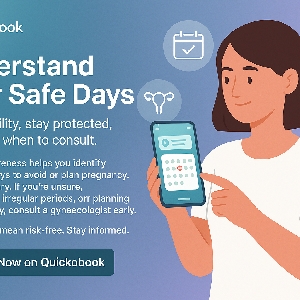
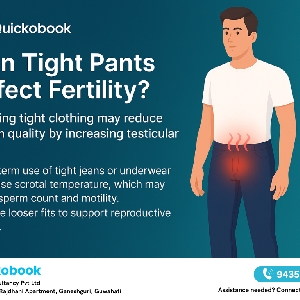
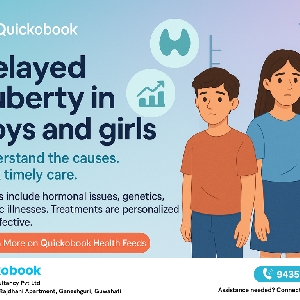
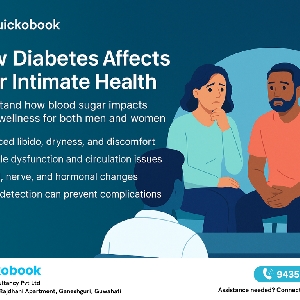
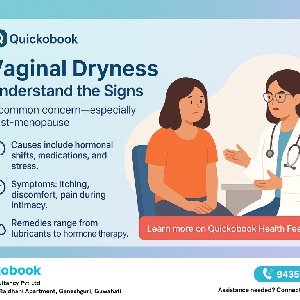
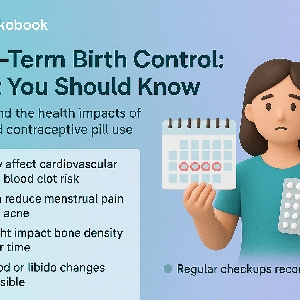
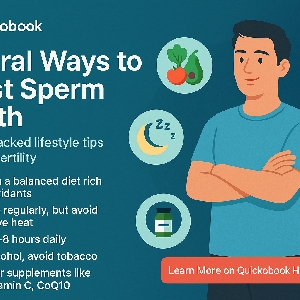
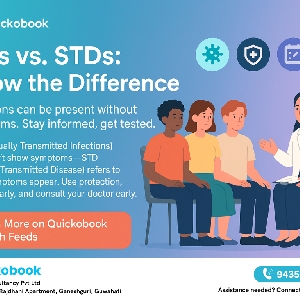
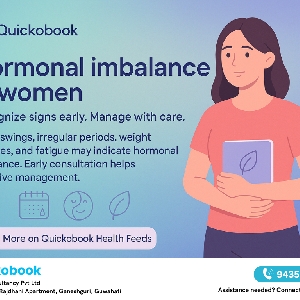
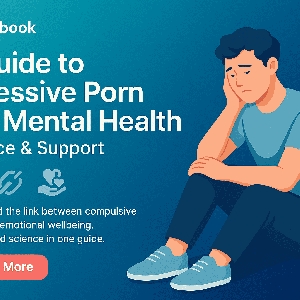

 Play Store
Play Store